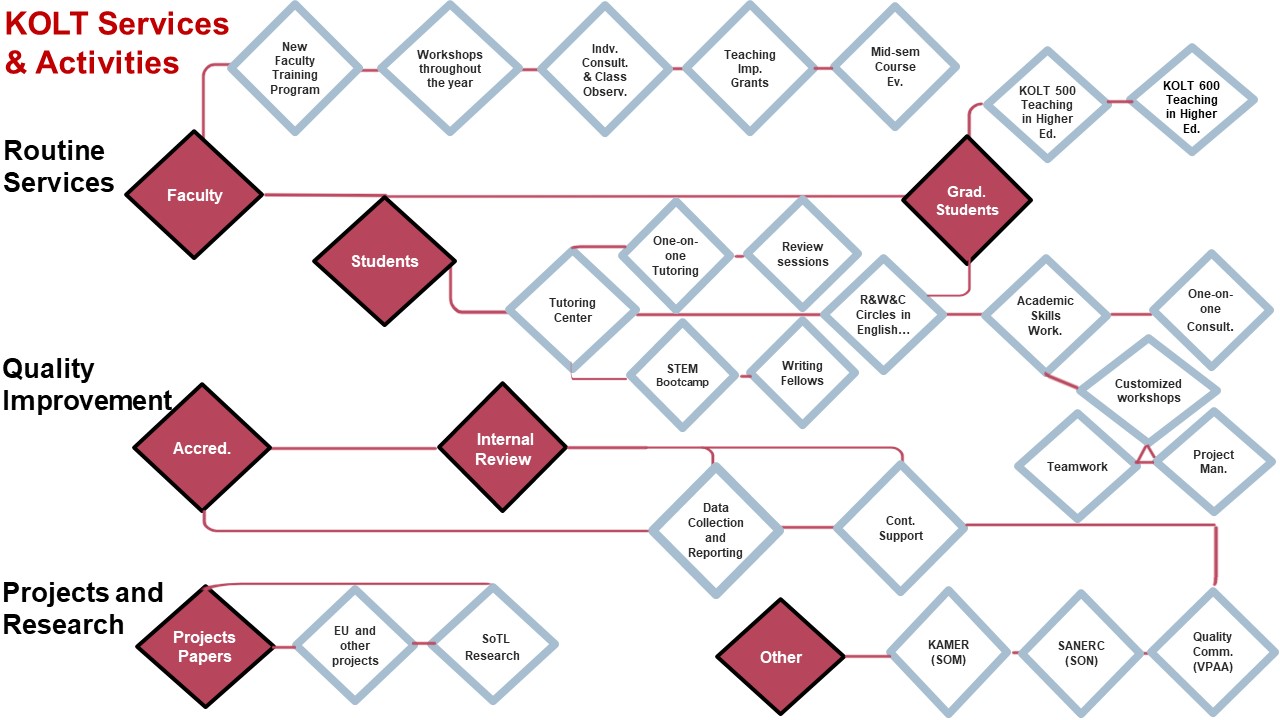- Students
- Faculty members
- Graduate students who are working as teaching assistants at Koç University.
Conversation Circles (CC) to promote fluency in spoken English, French, German and Turkish. The circles are moderated by native speakers of these languages.
Face-to-Face and Online Workshops:
- how to read and notes effectively in college courses,
- how to manage time effectively,
- how to prepare for an exam,
- how to take an exam,
- how to adjust to academic life at Koç University,
- how to avoid plagiarism,
- how to overcome procrastination,
- how to develop a project,
- how to give presentations using PowerPoint
STEM Bootcamp: The aim of this STEM Bootcamp program is to address students’ misconceptions and gaps in their high school Math knowledge and skills through a two-week accelerated small-group program. The program is intended to help students function better in their first-year Math courses. The program will be led by experienced STEM tutors at KOLT.
Writing Fellows: The main purpose of the program is to create a peer-to-peer learning environment through sharing of experiences. You can get support from KOLT Writing Fellow, especially regarding your writing assignments given in the core program courses. Writing Fellows enable students to work actively on their own writing and give feedback. Overall, they make valuable contributions to students’ better writing process.
- TA training workshops that usually include guidance on:
- best practices for effective teaching,
- clarity in teaching,
- classroom management,
- grading fairly
- emphasizing important topics,
- motivating students,
- encouraging class participation,
- ethics in teaching and learning.
- Group/Individualized microteaching sessions to enhance the quality of PS, DS and Labs,
- Resources, including books and videos on various aspects of teaching.
- KOLT500- 600 Teaching in Higher Education is a required course for graduate students. These courses aim to improve new coming students’ knowledge and skills in higher education teaching and learning. These courses will prepare the TAs for their prospective duties by providing training and resources that include tips and good practices for effective teaching, learning principles and introducing them to learning technologies and Blackboard (Learning Management System), and providing further opportunities for the TAs to develop themselves in different aspects of teaching.
For Faculty, KOLT provides a range of services that support excellence in teaching that match our university’s rigorous standards of research. These services include:
- Designing and leading new faculty orientation programs in effective teaching,
- Organizing and delivering seminars and workshops in various aspects of higher education teaching and learning.
- Facilitating mid-semester course evaluations, which report student feedback on courses’ good features as well as suggestions for improvement. Faculty members may request individual consultation afterwards.
- Offering Teaching Innovation Grants (up to 20,000 TL for each semester)
- Providing individual consultations for the following items:
- syllabus and content design,
- in-class activities,
- student engagement and interaction,
- video recording of classes,
- improving courses and teaching skills.
- Providing video-recorded feedback on classroom activities,
- Providing resources, including books and videos on various aspects of teaching.

